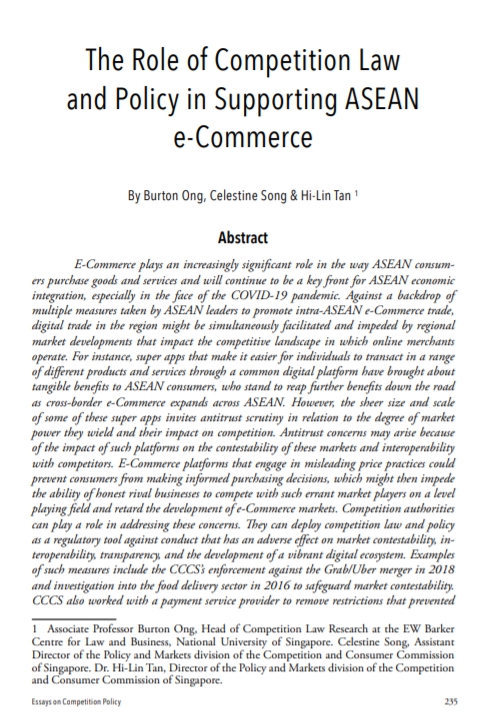
E-Commerce plays an increasingly significant role in the way ASEAN consumers purchase goods and services and will continue to be a key front for ASEAN economic integration, especially in the face of the COVID-19 pandemic. Against a backdrop of multiple measures taken by ASEAN leaders to promote intra-ASEAN e-Commerce trade, digital trade in the region might be simultaneously facilitated and impeded by regional market developments that impact the competitive landscape in which online merchants operate. For instance, super apps that make it easier for individuals to transact in a range of different products and services through a common digital platform have brought about tangible bene!ts to ASEAN consumers, who stand to reap further bene!ts down the road as cross-border e-Commerce expands across ASEAN. However, the sheer size and scale of some of these super apps invites antitrust scrutiny in relation to the degree of market power they wield and their impact on competition. Antitrust concerns may arise because of the impact of such platforms on the contestability of these markets and interoperability with competitors. E-Commerce platforms that engage in misleading price practices could prevent consumers from making informed purchasing decisions, which might then impede the ability of honest rival businesses to compete with such errant market players on a level playing !eld and retard the development of e-Commerce markets. Competition authorities can play a role in addressing these concerns. They can deploy competition law and policy as a regulatory tool against conduct that has an adverse effect on market contestability, interoperability, transparency, and the development of a vibrant digital ecosystem. Examples of such measures include the CCCS’s enforcement against the Grab/Uber merger in 2018 and investigation into the food delivery sector in 2016 to safeguard market contestability. CCCS also worked with a payment service provider to remove restrictions that prevented merchants from accepting other payment cards on common payment terminals and has developed a set of guidelines on price transparency to educate suppliers on when pricing practices may be potentially misleading, so that such practices can be reduced over time, thereby enabling consumers to shop confidently online. ASEAN competition authorities have also cooperated among themselves to achieve effective competition enforcement in their respective jurisdictions. For example, CCCS cooperated with competition authorities in Malaysia, Philippines and Vietnam on the Grab/Uber merger, where agencies shared non-confidential information and worked with other ASEAN competition authorities to develop a competition assessment framework for the e-Commerce sector. As nurturing a regional ecosystem that is conducive to ASEAN e-Commerce growth requires Member States to understand the impact of their respective governmental actions on competition and market access, national competition authorities can also play the advisory role to other government agencies in evaluating the impact of their policies on e-Commerce to avoid any unintended negative consequences on competition. Recognizing how empowering consumers with greater control over their data can support the growth of digital economy and trade, CCCS partnered with Singapore’s Personal Data Protection Commission to study how data portability might be facilitated to support the digital economy.
Accreditation: The whole publication is available at: The Evolution of Antitrust in the Digital Era: Essays on Competition Policy.The Competition Policy International (CPI) is the first publisher of this book.